Category: Construction Maintenance Electrician
Could You Be a Good Foreman After Completing a Construction & Maintenance Electrician Pre-apprenticeship Diploma Program?
January 15, 2024
The career path from a pre-apprenticeship diploma program in Construction and Maintenance Electrician to becoming a foreman is well-trodden. Pre-apprenticeship programs in Canada are essential precursors to diverse careers in the trades. However, this raises an essential question for those looking to explore new career horizons: “Can completing such a program prepare you to be a good foreman?”
Completing a pre-apprenticeship diploma program is a significant first step in becoming a foreman. It provides the technical groundwork necessary for this career. This blog post explores whether completing a Construction and Maintenance Electrician Pre-apprenticeship diploma program helps you become a good foreman.
Understanding the Role of a Foreman
A foreman in the electrical field is much more than just a skilled electrician. They are leaders, planners, and communicators. Foremen are responsible for overseeing the execution of electrical projects, managing teams, ensuring safety compliance, and liaising with other construction professionals. As our electrician courses highlight, this role requires a blend of technical knowledge, leadership skills, and practical experience.

How a Pre-apprenticeship Diploma Program Prepares You for the Role of a Foreman
Gaining Experience: Transitioning from an apprentice to a foreman requires significant field experience. You’ll need to work on various projects, understand electrical systems, and face real-world challenges. This experience is crucial in developing problem-solving skills and practical knowledge.
Developing Leadership Skills: Foremanship is as much about leading people as it is about managing electrical projects. Leadership training, either through additional courses or on-the-job learning, is vital. You need to be adept at motivating teams, resolving conflicts, and communicating effectively, and a pre-apprenticeship diploma program allows you to develop these skills through hands-on training projects.
Understanding Project Management: A foreman needs a good grasp of project management principles. This includes scheduling, budgeting, and resource allocation. A pre-apprenticeship diploma program will introduce these concepts and allow you to master them through further education or mentoring.
Staying Updated with Technology and Codes: The electrical field is continuously evolving. A good foreman stays updated with the latest technologies, tools, and code changes. Continuous learning is a part of the job, and electrician training programs can help develop your love for learning.

Safety First: Foremen are responsible for the safety of their team. A deep understanding of safety protocols and the ability to enforce them is non-negotiable. Pre-apprenticeship programs can introduce you to safety regulations and equip you with the knowledge to ensure full compliance.
How Our Electrician Pre-apprenticeship Prepares You for a Foreman Career
The Construction & Maintenance Electrician Pre-Apprenticeship Diploma Program at NATS offers a well-rounded foundation for aspiring foremen. In our classrooms, students are well-equipped to learn vital skills like residential wiring, service installation, code interpretation, conduit bending, and print reading. Our labs provide hands-on experience in residential, commercial, and industrial electricity, focusing on practical skills such as analyzing and repairing machine controls, electronic controls, and electrical motor theory.
This comprehensive training, which blends theoretical knowledge with practical application, prepares graduates for the multifaceted challenges of a foreman role, ensuring they possess the technical expertise and problem-solving abilities essential in the electrical construction and maintenance industry.
Are you interested in our electrician pre-apprenticeship?
Contact NATS for more information.
4 Reasons To Take Electrician Training In 2024
December 12, 2023
The demand for skilled electricians is rising in an era dominated by technological advancements and a growing emphasis on sustainability. As we enter 2024, the need for professionals in the electrical trade is more significant than ever. If you’re contemplating a career change or looking for clarity about your possible future path, here are four compelling reasons why taking electrician training in 2024 might be your ticket to a rewarding and in-demand profession.
1. Step Into a Thriving Job Market
The digital age has brought about a surge in reliance on technology, leading to an increased demand for electricity. As our homes, businesses, and industries become more dependent on electronic devices, the need for skilled electricians is skyrocketing. From installing wiring in new constructions to repairing and maintaining existing electrical systems, electricians play a crucial role in keeping the lights on. Job Bank Canada projects a positive industrial outlook for electricians in the country, making it a promising field for those seeking stable and well-paying employment.
Beyond this, jobs do not come much more future-proof than electricians’. As technology advances, there’s a lot of buzz around robots taking over jobs, whether on the assembly line or in the office. But you know what? Electricians don’t need to stress about it. Their work is all about adapting to the specific situation or problem at hand, and that’s something robots can’t quite master yet.

Amid all the automation concerns in different industries, electricians have a unique situation. Their job requires a personal touch, a level of quality work that robots just can’t match. It’s not a one-size-fits-all kind of gig; it’s about tailoring their skills to the job. So, while the talk about AI and robots taking jobs might make some industries uneasy, electricians can rest easy knowing that their expertise and knack for personalized solutions keep them irreplaceable.
2. Embrace Green Technology Through Electrician Training
There has been a significant shift towards sustainable and eco-friendly practices in recent years. The electrician’s role is evolving to accommodate this change. Renewable energy sources, such as solar and wind power, are gaining momentum, and electricians training in green technology are in high demand.
By enrolling in pre-apprenticeship electrical training in 2024, you position yourself at the forefront of this shift, learning to install and maintain solar panels, and other green energy systems. This opens up new career opportunities and allows you to contribute to a more sustainable future.

3. Integrate Automation and Smart Technology Into Your Work Life
The rise of smart homes and automated systems transforms our lives and work. Electricians with expertise in innovative technology are becoming increasingly sought after. From installing smart lighting and security systems to configuring home automation hubs, the modern electrician is a tech-savvy professional.
By taking electrician courses, you equip yourself with the knowledge and skills to integrate innovative technology into residential and commercial spaces. This expertise positions you as a valuable asset in an industry rapidly embracing automation.
4. Opportunities for Job Diversity and Independence
One of the most appealing aspects of a career as an electrician is the diversity of job opportunities and the potential for independence. Electricians can work in various residential, commercial, and industrial settings. Additionally, many electricians eventually opt for self-employment, running their businesses.
Electrician training provides a versatile skill set that allows you to adapt to different work environments and pursue entrepreneurial ventures. The ability to take on a range of projects and the potential for self-employment offer flexibility and independence that few other professions can match.
Are you interested in our world-class Pre-Apprentice Electrical diploma?
Contact NATS for more information.
Residential, Commercial, Or Industrial: Which Path Will You Take After Electrician Training?
June 22, 2023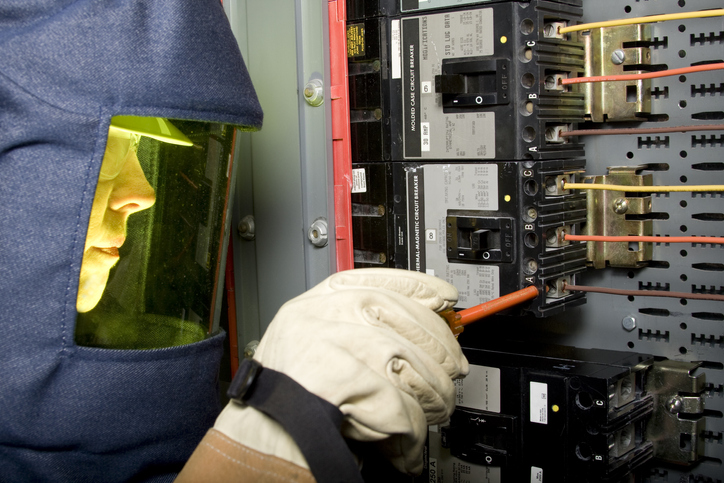
Many people who enrol in the Construction Maintenance Electrician Diploma Program at North American Trade Schools (NATS) already have a clear idea of where they would like to work before they even register for the program. Conversely, some others prefer to go with the flow and see what piques their interest along the way.
Irrespective of which side of the spectrum you fall in, the question of which path you’ll take after electrician training is an important one since there are typically differences between residential, commercial, and industrial electricians.
Ultimately, the decision should come down to which career path best suits your interests and career goals. To help narrow your focus leading to an informed decision, we’ll explore each of these career paths in this blog.
Residential Work After Electrician Training
Residential electrical work focuses on homes, apartments, and other residential properties. On a typical day as a residential electrician after your Electrician training, you’ll be responsible for installing, repairing, and maintaining electrical systems in these settings. This often involves tasks like wiring new homes, troubleshooting electrical issues, or upgrading outdated systems. One of the advantages of working in the residential sector is the opportunity to work directly with homeowners, helping them improve their living spaces and ensuring their electrical systems are safe and efficient. Residential work also offers more regular working hours, allowing for a better work-life balance.
Commercial Work After Electrician Training
On the other hand, commercial electricians deal with electrical systems in non-residential buildings such as offices, retail stores, and public facilities. Commercial work often involves large-scale projects, such as installing electrical systems in new commercial buildings or upgrading existing systems to meet code requirements. Typically, commercial electricians execute tasks like setting up lighting systems, installing security systems, or performing routine maintenance. Commercial work can be fast-paced and diverse, providing opportunities to work on a wide range of projects and collaborate with other professionals in the construction industry.

Industrial Work After Electrician Training
Industrial electrical work takes you into the realm of factories, power plants, and other industrial settings. In this sector, you’ll work with complex electrical systems that power heavy machinery, production lines, and industrial processes. Industrial electricians often use high-voltage systems, motors, control panels, and automation technologies. This type of work requires a strong understanding of industrial equipment and safety protocols. Industrial electricians may troubleshoot electrical issues under time pressure to minimize downtime and keep production running smoothly. Working in the industrial sector can be challenging but highly rewarding, with opportunities for career advancement and specialized training.
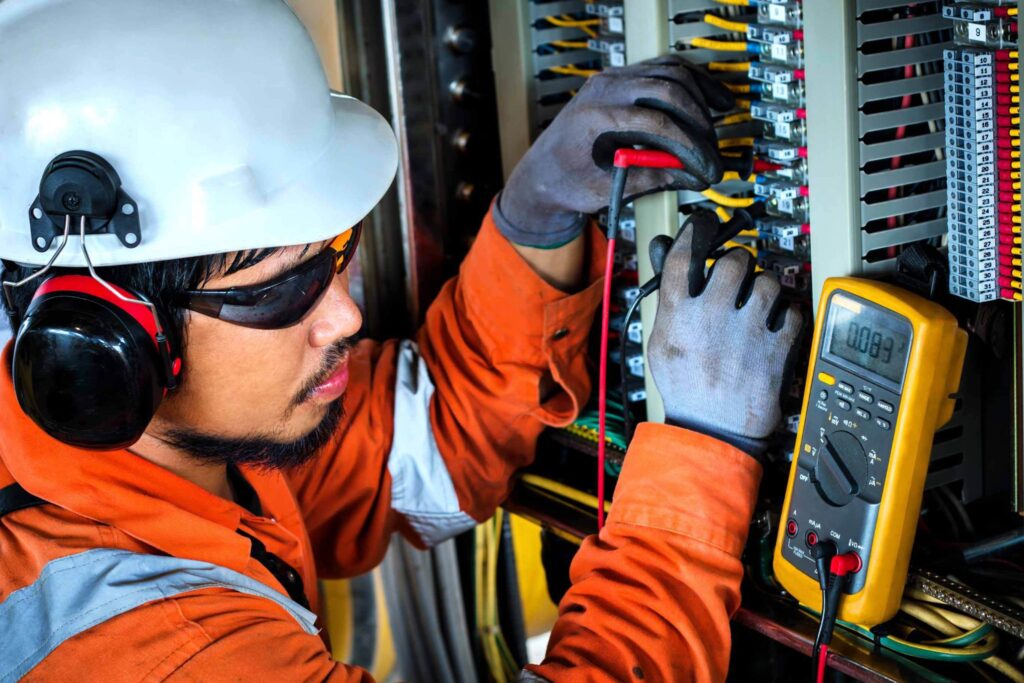
Which Path is Right For You?
When deciding which path to take after electrician training, it’s important to consider your personal interests, skills, and long-term goals. Do you enjoy working in various settings or prefer the stability of residential work? Are you intrigued by the complexity of industrial electrical systems or drawn to the fast-paced nature of commercial projects? It’s also worth noting that you can start in one sector and transition to another later in your career. Many electricians gain experience in one area before exploring new opportunities. Regardless of your chosen path, ongoing learning and professional development are essential.
If you’re interested in obtaining a more detailed understanding of each of these paths and the processes associated with them, consider registering for the Construction and Maintenance Electrician diploma Program at NATS.
Are you ready to start training toward your career at an Electrician college?
Contact NATS to learn how you can get started!
3 Rough-In Tips to Remember After Electrician Training
June 07, 2023
Rough-in wiring involves installing electrical wiring, boxes, and conduit in commercial or residential buildings before the walls and ceilings are completed. It’s a necessary process that sets the foundation for a safe and efficient electrical system in any building.
Regardless of the type of project being executed, it’s important to get the rough-in phase done right the first time. Ripping up the drywall to fix issues down the line can be messy, not to mention expensive. It’s also essential to be careful with this task to avoid the risk of electric and fire hazards. Attention to detail and adherence to electrical codes are necessary for a high-quality installation.
After completing your Construction & Maintenance Electrician Pre-Apprenticeship diploma program, you’ll often be tasked with projects like these. Here, we’ll discuss three practical rough-in tips that will prove invaluable throughout your career. Incorporating these tips into your work routine after completing electrician training will help you build a reputation for excellence and contribute to electrical systems’ safe and efficient operation.
1. Plan and Prepare Adequately After Electrician College
Before starting any rough-in work, careful planning is crucial. Begin by reviewing the electrical plans and blueprints for the building to understand the project scope clearly. Take note of the locations for outlets, switches, light fixtures, and other electrical components.
Next, ensure you have all the tools and materials readily available. This includes wires, cables, conduits, junction boxes, and fasteners. Organize your supplies to avoid unnecessary delays during the installation process.
Additionally, before commencing any rough-in work, shut off the power supply to the area where you will be working. As taught in Electrician training, safety should always be the top priority. Taking this precautionary measure will prevent accidents or electrical shocks.
2. Get Accurate Measurements and Layouts
During the rough-in phase, precision is essential. Accurate measurements and layouts ensure that electrical components are installed correctly, avoiding future problems or the need for costly rework. Students who undergo their Electrician diploma program know this process is often emphasized during their training.
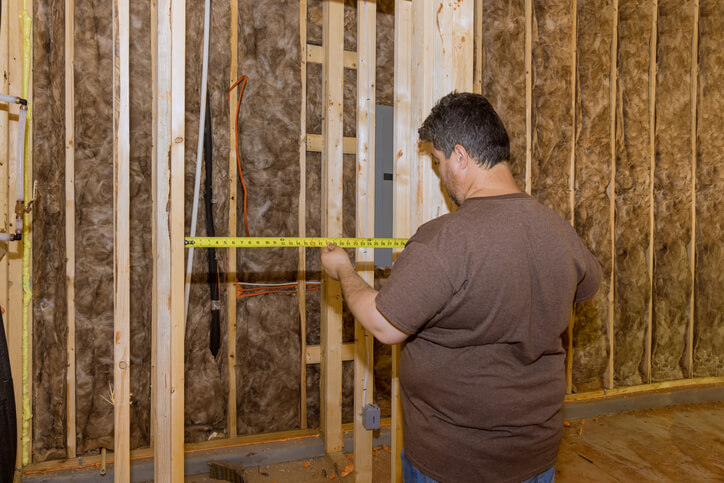
Mark the locations of electrical boxes on the walls and ceilings according to the provided blueprints, then use a tape measure and level to ensure the measurements are precise. Consider any obstructions, such as studs or pipes that may affect the placement of the boxes. Similarly, when running conduit or cables, maintain consistent spacing and alignment. This will facilitate future wire-pulling and make identifying and troubleshooting issues easier if necessary.
Further, pay close attention to electrical code requirements, including minimum clearance distances around boxes and conduits, and remember compliance with electrical codes is crucial for safety and ensures the installation meets industry standards.
3. Label and Document Each Step
The rough-in phase is the foundation for the entire electrical system, and documenting your work is invaluable for future reference. As you install wires, cables, and conduits, take the time to label them appropriately by using tags or markers to indicate the purpose and destination of each cable or wire. This makes it easier for future electricians or technicians to identify and troubleshoot issues.

You should also create a comprehensive documentation system that includes diagrams, plans, and any modifications made during the rough-in process. This information will be invaluable for future maintenance, repairs, or upgrades. Remember to photograph the rough-in work before the walls and ceilings are closed. These photos can provide evidence of a job well done and a visual reference if needed.
Are you looking to join a world-class Electrician college?
Contact NATS to learn how to get started.
Networking Tips For An Apprentice After Electrician Training
February 28, 2023
Networking is important no matter which industry you are in, because it allows you to form mutually beneficial relationships with other professionals in your field. Once you become an apprentice after electrician training, you’ll be looking to grow in the trade – honing your skills and gaining access to professional opportunities. Networking is a great way to meet and stay in touch with seasoned industry experts and those just starting out like you. Having a broad network can open many doors for you professionally, helping you stay on top of new opportunities.
Read on for some great networking tips to keep in mind during your training and throughout your career.
Partake in Industry Events and Conferences
Industry events and conferences are great ways to network with people in your industry. While larger conferences do not necessarily happen often, it is important to attend them because you will have the opportunity to learn from and discuss with other electricians and apprentices, and create beneficial relationships.
A great way to learn about these conferences and events is either online or through your instructors during your Electrician diploma. Your instructors are experienced in the industry and have already built their network over several years. They are great starting points for discovering these events and conferences. Online, you will find many different events, and the beauty of these is that they occur digitally and can be attended no matter where you are.

Use Social Media to the Fullest Extent
Social media is a great networking tool that you can utilize at any point, and it will be beneficial for years to come. There are two primary social media networks you should be using to network during and after Electrician training – these are LinkedIn and Facebook. LinkedIn is great for forming connections with qualified electricians or apprentices. You never know when someone who you interacted with on social media may be able to present an opportunity to you, and vice versa. A great starting point is your instructors and fellow apprentices.
Facebook is a little different in that it would be more advisable to join a local electrician group instead of adding people as friends. This allows you to interact with people in the same career as you and enables knowledge sharing. There may also be opportunities for apprentice electricians posted on these groups. The key is to maintain consistent contact. Speak to instructors and fellow apprentices about electrician groups, otherwise, a Facebook search can also put you in the right direction.

Keep in Contact With People You Meet in Electrician Training
During electrician training, you will interact with your instructors and classmates, so try to develop relationships that will help you to expand your network. Keep in contact with them after you have completed your training, because your instructors can introduce you to people in the industry, since they’re extremely knowledgeable and have contacts there. Your peers may also find other opportunities that they can share with you. It takes time and effort, but having a great network will reap its benefits in the longrun.
Are you ready to begin Electrician college?
Contact NATS to learn how you can get started.
Interesting Career Paths to Explore After Construction College
January 25, 2023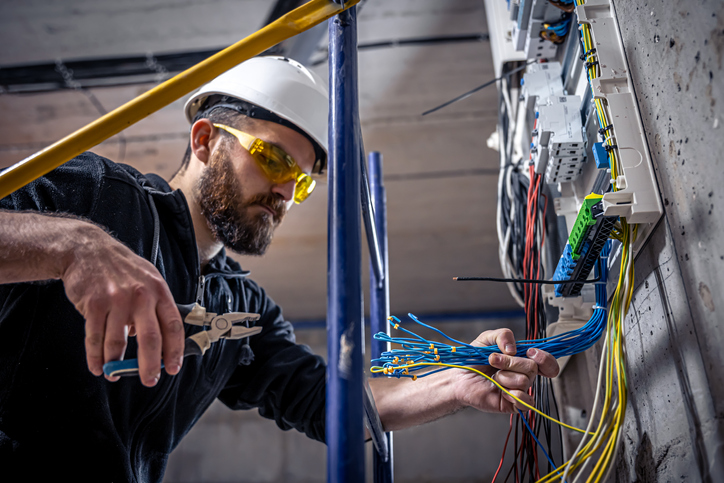
The construction industry consists of individuals with varying skills. All of these skilled workers play a role in making sure that construction projects meet the specifications outlined in their planning. A good construction program will prepare you to meet the needs of the industry, helping you thrive in your career.
During the construction program at NATS, you will learn the skills to fulfil several electrical industry aspects successfully. You will also learn residential wiring, code interpretation, conduit bending, electrical motor theory, service installation, print reading, and electronic controls. These are skills you can apply to various career paths upon completing the program. Read on to learn more about the careers that will be available to you after your training.
Become an Electrical Technician
An electrical technician is a skilled worker that focuses on installing wiring, ensuring that the wiring works correctly, and installing circuits and outlets to power electronics, lights and other equipment in a building. Professionals in this career will need to be able to read electrical blueprints and follow electrical codes and regulations. During construction training, you will learn these skills through practical, hands-on training. For instance, you’ll complete practical, real-world projects installing wiring similar to what you will see when working as an electrical technician.
Becoming an electrical technician will create work opportunities for you in both residential and commercial construction. You will also be able to work in a company’s maintenance department and see to the electrical needs of the company as they happen.

Become an Electrical Service Technician After Construction College
As an electrical service technician, you will specialize in ensuring that electrical equipment and systems remain operational and function as they need to. You may be required to modify systems or repair them completely.
During construction college, you will learn different wiring methods for conduits, tubing and bends. This will help you rewire electrical devices where the wiring has corroded or is no longer functional. You will also learn how to apply the Canadian Electrical Code (CEC), ensuring that repairs and rewiring are done to the standard required.
Become an Electrician by Continuing Your Apprenticeship
As a graduate earning your Construction and Maintenance Electrician Diploma, you will be an apprentice electrician. This will allow you to continue studying the electrical trade to become a qualified electrician. While becoming a qualified electrician may be longer, it is worth considering. This is primarily due to the demand for qualified electricians in Canada. Job prospects for electricians in Canada are good and look to remain this way for years to come. Becoming a fully qualified electrician will also open other opportunities, including starting your own business.
The training you receive during your diploma program will equip you with the foundations of being an electrician. You will learn electrical theory and principles and how to apply them practically. You will also learn the foundations of what an electrician needs to know, such as wiring, the CEC, and safety principles, ensuring you are well-equipped to continue your studies to become a fully-qualified electrician.

Are you ready to begin your construction courses?
Contact NATS to learn how you can get started.
Workmanship Best Practices to Remember After Electrician Training
December 06, 2022
Once you grasp the basics of electrical theory in training, it’ll be time to put your knowledge to work during your electrical apprenticeship. This will be an important part of your career development, providing you with the perfect opportunity to refine your practical skills, make professional connections, and earn a living all at once. Your apprenticeship is one big learning experience, and establishing good workmanship habits is one of the most important lessons you’ll learn.
As an electrician, good workmanship reflects positively on you and the company you are with. Excellent workmanship ensures public safety and simplifies future repairs. Referring to checklists, being conscious of wire sizing, and doing your best to complete your work in an orderly fashion will go a long way. Let’s dive deeper into some of the strategies you can use during your apprenticeship and your career!
1. Refer to a Checklist After Electrician Training
When you start out on the job, you’ll find there are many steps to the electrical wiring process, some of which can be a challenge to remember. In that case, it’s important to ensure that you’ve taken all the necessary steps to maximize the safety of your work–for your own sake and that of the public.
When you’re fresh out of electrician training, it’s an excellent idea to refer to a checklist when you start completing tasks independently. This will help you remember all of the essential steps to installing or wiring electrical systems. This checklist could be provided by your workplace or your training institution, or you can even use course material to create your own checklist, which one of your higher management can approve.
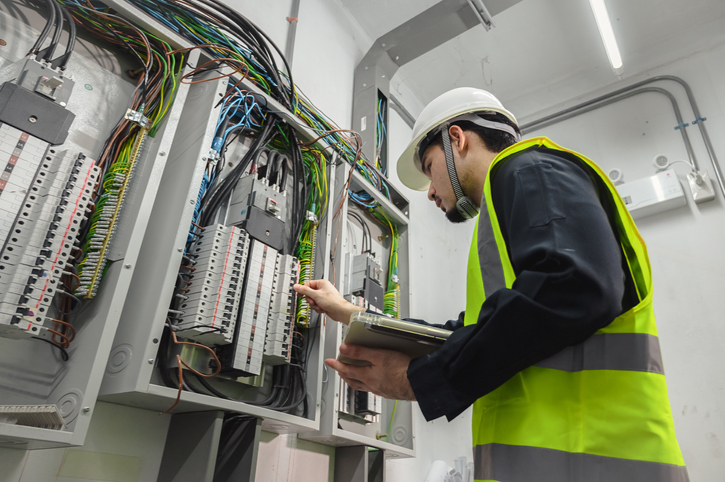
2. Always Be Conscious of Wire Sizing
Proper wire sizing is crucial to quality workmanship as it determines the safety, reliability, and consistency of an electrical system. For example, overloaded cables are one of the most common causes of electrical malfunction. This occurs when too much electrical current passes through–causing wires to overheat, melt, and pose a fire hazard. On the other hand, cables that are too big are a waste of money for clients and your company.
After electrician college, do your best to ensure that you’re accurately determining the electrical load for the systems you’re working on in order to choose your cable size correctly. Don’t hesitate to ask for second opinions until you trust your own judgment; safety should be your chief concern with cable size.

3. Keep Your Work Neat and Tidy
When you install and repair electrical systems, focus on keeping the finished work clean and tidy. Not only does it look better and leave a positive impression on you and your company, but on a practical level, it makes future repairs much easier, since there are fewer tangles, twisting, knots, and general confusion. The best way to ensure that your work remains neat and tidy is to take all the time you need to complete your work correctly and in an orderly manner.
Approaching your work while you maintain a clear mind will also be helpful.
The Construction and Maintenance Electrician Pre-Apprenticeship Diploma Program is an excellent place to start your electrical career. At NATS, you’ll gain the skills you need to apply quality workmanship to residential wiring, service installation, code interpretation, conduit bending, print reading, and electrical theory.
Ready to earn your electrician diploma?
Contact NATS to learn more!
How to Succeed in Your Electrical Apprenticeship After Electrician Training
November 15, 2022
The road to becoming a licensed electrician is a rewarding one. First, you’ll learn the fundamentals of the trade in a certified training program. Once you’ve learned the basics, you’ll have the opportunity to earn money as you learn during your apprenticeship. This is a great time to hone your skills, learn the electrical codes in your area, purchase the right tools, learn how to use them properly, and make meaningful professional connections. Let’s explore some effective ways to succeed during your electrical apprenticeship!
Ask Questions to Absorb as Much Information as You Can
You may need to approach your apprenticeship differently than you might other positions. While being able to earn an income is a huge perk of an electrical apprenticeship, your main priority should be to learn and practice your skills. Whenever you can, try to absorb new information. Listen attentively when others offer feedback and try to remember it. Keep your eyes open when licensed electricians complete tasks.
As you watch, look for parts of the process that don’t make sense to you and ask clarifying questions. As your apprenticeship progresses, try to answer some of your own questions using your prior knowledge and experience. That being said, it’s always a good idea to double-check when you’re unsure. Remember that mistakes are a normal part of the learning process, and try your best to turn yours into valuable learning experiences after electrician college!
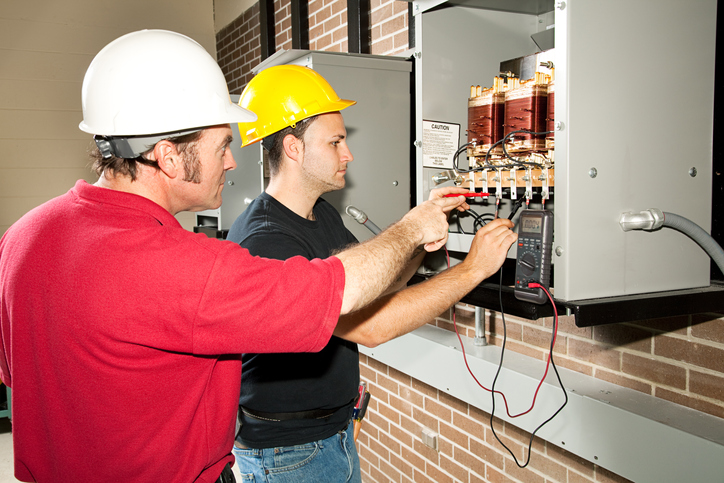
Understand the National Electrical Code
This one may take some time. The Canadian Electrical Code is a long document published by the Canadian Standards Association. It’s full of information about how to safely install and maintain electrical equipment in Canada. It’s a great idea to make sure you have access to a copy that you can refer to when you need extra clarification. A clear understanding of electrical standards will help you stay safe on the job, as well as protect the safety of clients. Have faith in the learning process! With time, you’ll become familiar with the electrical code in your area. Keep in mind that the Canadian Electrical Code is revised every three years, so be sure to stay up to date.

Master the Art of Networking After Electrician Training
During and after electrician training, networking should be a priority. Your success in most fields will depend heavily on your ability to build meaningful relationships in the workplace–in addition to your skill and experience level, of course. On the job, try to be personable and open to meeting new people. You have no idea what conversation could lead to a major opportunity for career advancement, so always put your best foot forward and don’t hesitate to share your contact information when you’ve established a connection.
Your electrical apprenticeship will be an exciting phase of your career. The Construction & Maintenance Electrician Pre-Apprenticeship Diploma Program can help you find success as you learn and earn. Receive hands-on training on electricity principles and applications, blueprint reading, framing, and more!
Ready to enrol in earning an electrician diploma?
Contact NATS to learn more!
Residential vs. Commercial Wiring: A Guide for Those Considering Electrician Training
October 11, 2022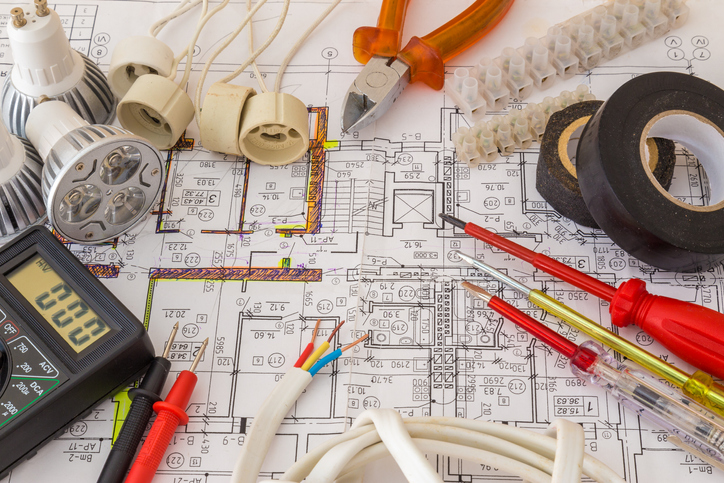
Do you want to launch a career as an electrician? If so, you’re in for a dynamic, interesting, and lucrative work life that will give you the opportunity to collect many valuable experiences and use them to seek higher positions. During your electrical apprenticeship, you’ll likely have the opportunity to explore both residential and commercial wiring. This will allow you to decide on your area of focus down the line as a licensed electrician.
To get you thinking, here are some of the key differences between residential and commercial wiring and what to keep in mind when doing both types of work.
Different Materials Are Used for Residential and Commercial Wiring
One notable difference between commercial and residential wiring is the material the wires are made from. Residential wires, which are typically hidden behind drywall, are only covered with a thin PVC sheath. Commercial wiring typically has a greater amount of insulation in order to withstand higher temperatures. The wires are usually protected by a thick sheath of Nylon, a tough thermoplastic that makes an excellent electrical insulator. In addition, commercial wires are held to higher codes than residential wiring, so higher-grade materials are needed.
A Conduit Is Always Used For Commercial Wiring
An electrical conduit is a metal or plastic tube through which an electrical wire is run; the primary purpose is to protect the wires. After electrician college, you’ll find that the use of conduits depends on local codes. That being said, conduits are generally considered a must in commercial settings. They are used for residential applications as well, primarily when the wire remains exposed as they would be in an unfinished basement, crawlspace, or attic.
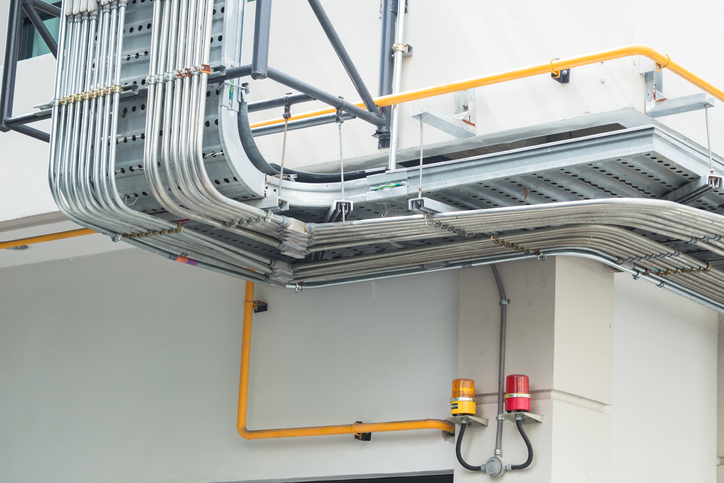
After Electrician Training, Load Capacity Will Differ For Commercial and Residential Wiring
Electrical load capacity refers to the total amount of power provided by a building’s main source of power. In general, a commercial setting will have a higher load capacity than a residence. Usually, a single-phase circuit of 120 volts is used. Single-phase systems require only two lines–one for power to enter and a return path. For appliances like refrigerators, washers, and dryers, two-phase systems of 240 volts are used.
When you work in a commercial setting after electrician training, you’ll find that three-phase systems are used, which are comprised of two 120-volt legs and a wider 208-volt leg. This system reduces the load on each individual line while maximizing the overall output of an electrical circuit.
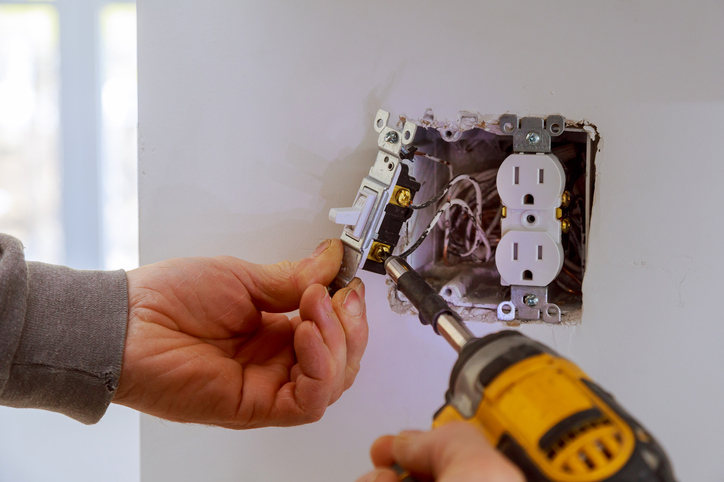
Ease of Access Differs Depending on the Type of Wiring
With residential wiring, safety and aesthetics are the main priorities. For this reason, wires are tucked away and out of sight. This makes residential electrical lines a bit less convenient to access. Commercial wiring on the other hand does not require as much consideration for aesthetics, so they’re often easy to access.
The Construction Maintenance Electrician program at NATS will teach you the ins and outs of residential, commercial, and industrial electricity. In addition to electrical theory, you will leave the program with well-rounded practical skills in code interpretation, circuit building, and print reading. As a result, you will be ready to take up an electrical apprenticeship confidently and competently.
Ready to start electrician school?
Contact NATS for more information!
5 Opportunities For Advancement After Construction College
October 04, 2022
Learning the core principles of electricity and construction is a great way to begin your career. However, you may be wondering exactly how you might continue to advance your career after graduation. Work is often more satisfying when there are opportunities to progress and seek higher, more lucrative positions for yourself. Luckily, you have many options at your disposal when you train as a Construction and Maintenance Electrician with the North American Trade Schools. Below, explore five great opportunities for advancement available with the skill set you’ll gain during your program.
1. Start an Electrical Apprenticeship to Open Doors in Your Career
Electrical construction is a lucrative and interesting field with many opportunities for career advancement and many different work environments to choose from. To open doors in this field, you should first enrol in an electrical apprenticeship after construction college with NATS. This way, you’ll gain all of the hands-on experience you’ll need to wire industrial or residential buildings safely and effectively. When looking for an apprenticeship, do your research and select a reputable company that consistently leaves customers satisfied. You’ll want to learn how to be an outstanding electrician first in order to continue advancing your career.

2. Become a Journeyman Electrician After Construction College
A journeyman electrician is qualified to work on all sorts of electrical systems. The job includes installing, repairing, and maintaining these systems within various settings. After completing your training, taking a four-year apprenticeship, and completing 6000 hours of technical, on-the-job training, you’ll be equipped with the skills for this career. The experience you gain in this position will prepare you to become a master electrician, which will significantly increase opportunities for growth and earning potential.
3. Consider Becoming an Electrical Inspector
After you’ve been working in the field for some time and have developed a degree of expertise, you might consider becoming an electrical inspector. The position involves inspecting generating systems, appliances, electrical wiring, and motors. You’ll work primarily on construction sites and in homes, ensuring that electrical systems are up to code and in good working condition. An electrical inspection may also involve making repairs to bring systems up to standard.

4. Are you a Good Teacher? Become an Electrical Instructor
Once you’ve gained confidence in your skills after graduating from construction school, instructing is a great option. This career path is very rewarding as you can use your knowledge and experience to help others pursue a career they’re passionate about. Responsibilities include planning and preparing learning materials, teaching the core principles of electrical technology, and adapting teaching methods to meet the needs of each student. In some cases, you may be asked to contribute to program planning.
5. Work For Yourself as a General Contractor
Have you always wanted to try your hand at business? You’re certainly not alone. Entrepreneurship can be extremely lucrative and fun, especially in the construction sector! Once you’ve become a master electrician, which involves three years of field experience and passing a licensing exam, you can run your own electrical company and enjoy the freedom and limitless possibilities that come with entrepreneurship. General contractors have the opportunity to work in industrial, commercial, and residential environments, depending on what clients they cater to.
Ready to start your path in one of the construction careers?
Contact NATS for more information!



